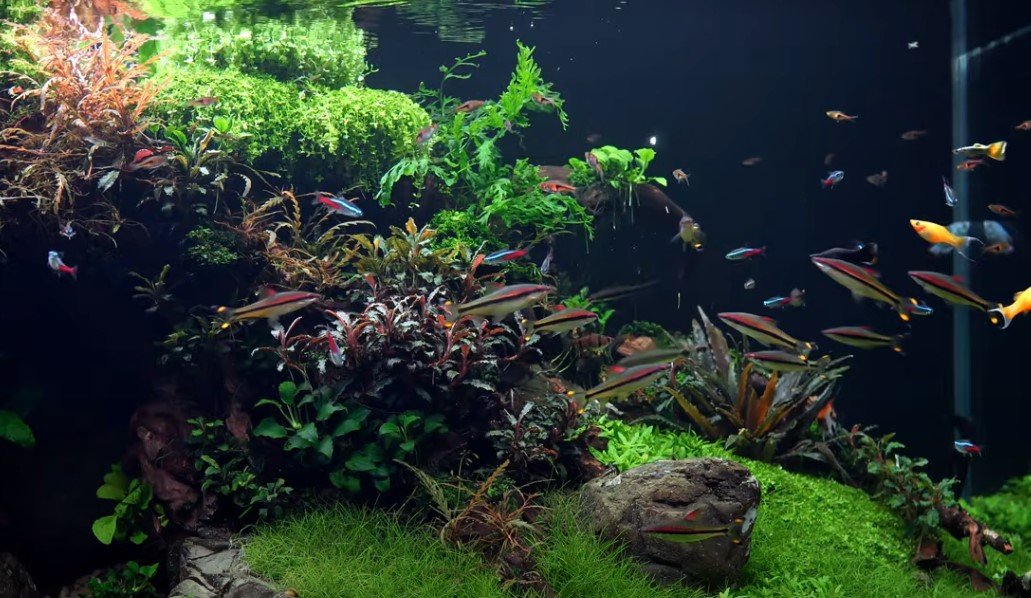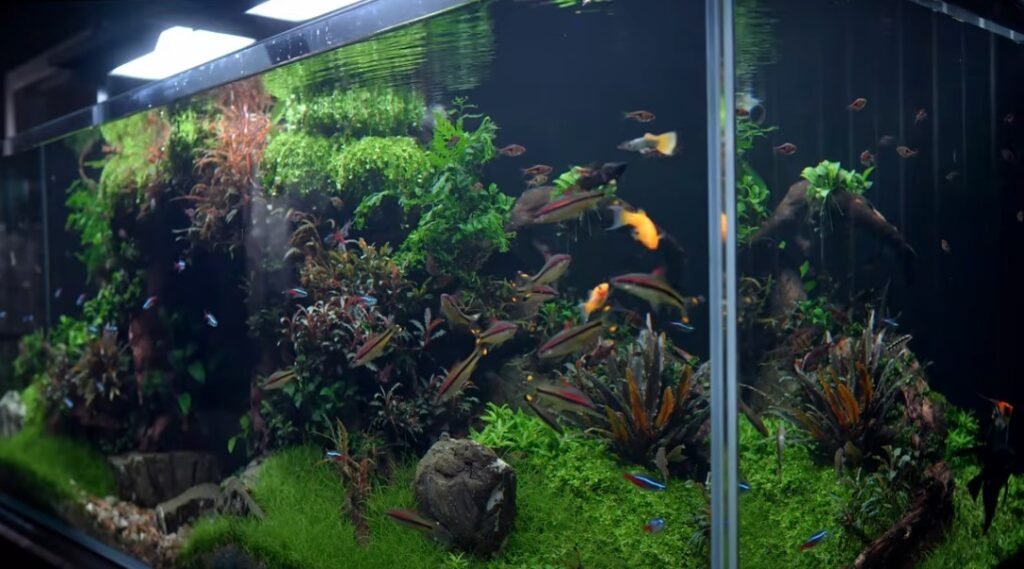Tropical fishes in aquariums can live without food for 3-7 days. The duration depends on factors relevant to their inherent attributes, temperature and, most importantly, their food habits.

Taking your pet fish with you on vacation is never a good idea. Going away from them for a few days may draw some concerns in your mind. But tropical fishes will survive, taking various parameters into account.
Let us explore more about this in the sections below!
How Long Can Tropical Fish Live Without Food?
If you are new to having pet fish, it’s pretty normal to be curious about the lifespan of fish without food.
Planning to be away from home might get you concerned about the health of the fish in your aquarium.
That said, let us look at the lifespan of several tropical fishes for aquariums in the aquarium below:
| Fishes | Lifespan Without Food (Days) |
| Goldfish | 4-5 |
| Guppy | 10-14 |
| Catfish | 3-7 |
| Molly Fish | 3-7 |
| Zebra Danios | 14 |
| Neon Tetras | 7-14 |
| Angelfish | 3-5 |
| Oscar | 12-14 |
| Platy Fish | 7-14 |
| Cherry Barbs | 14 |
| Congo Tetras | 7-8 |
| Dwarf Gouramis | 14 |
| Adult Swordtails | 5-7 |
The lifespan of the fish species mentioned in the table may vary depending on certain factors.
Temperature is one of those notable factors, as all the durations here are based mainly on the ideal room temperature where the aquarium will be placed.
Feeding criteria for these tropical fishes vary a lot. In the natural environment, not all of these fishes regularly feed.
Moreover, the time you provide the fish food supplements before leaving also matters.
What Are The Dietary Requirements Of Tropical Fishes?
Aquarium fishes are good pets to have in your home. But just like any other pet type, these fishes need a specific diet that can keep them healthy.
Especially for tropical saltwater fishes, a balanced diet is no compromise. The well-fed tropical fish in the aquarium will have increased capabilities to fight against diseases and be less stressed.
Mostly, these fishes require multiple nutrients that help keep them healthy and ensure their growth. The prominent nutrients are – protein, carbohydrates, fats, vitamins etc.
In the diet of each aquarium fish type, these elements must be present in appropriate proportions. Let us look at the dietary requirements for different aquarium fish types.
Carnivores
Carnivorous fishes in the aquarium usually feed on insects, larvae and other small fishes.
The diet of these fishes should be dominated by protein, and marine foods should be prioritized.
Krill, mysis shrimp and worms would constitute their total diet’s 50-70% protein requirement.
Herbivores
Herbivorous fishes mainly depend on plant-based diets. In their food, at least 1/3rd should be vegetables, and regular marine feeders like algae, plankton or traditional seafood should constitute the rest.
Omnivores
Omnivorous marine fishes are the most common tropical fishes suitable for aquariums. They have the traits of herbivorous and carnivorous fishes.
The food composition of their diet should mostly be dominated by vegetables and around ⅓ part by protein elements. These proportions would ensure a healthy balanced diet for them.

Factors That Can Affect The Duration Of Fish Living Without Food
The duration of different fish species surviving without food depends mainly on several factors.
Therefore, before you plan for a vacation and leave your fish for a few days, you must remember those things. We’ll be discussing some of those prominent factors right down here:
Pet Fish Size
A lot depends on the size of all the fish species inside your fish tank. As these fishes age, they grow in size.
The fishes that have grown into adults are more tolerant than the smaller or younger ones.
It suggests that bigger fish in your tank can survive much longer than the smaller ones with no food supplement supplies for a few days.
Temperature
The temperature that all the fish has to sustain during the period you are away has considerable impacts.
When your aquarium temperature is on the higher side, the tropical fishes tend to eat more.
Because high temperatures in the water play a big part in the fish’s metabolism. As a result, the fish may struggle due to starving in the fish tank.
Fish Activeness
If the fish inside your aquarium are highly energetic, they will have a faster metabolic rate. In this regard, the smaller fishes have more tendency to be active.
These smaller fish have a high food consumption rate, as they have more calorie requirements.
Leaving these fish types without proper supplements risks their death due to starvation.
Water Quality
It isn’t directly relevant to the food supply inside the tank, but water quality can affect fish survival.
If the water quality is poor inside, increased ammonia or nitrate levels will hamper fish life.
This thing has a drastic impact when starvation kicks in particular species inside the fish tank. Therefore, a clean tank is a prerequisite before you leave for a vacation.
Tank Configuration
If your pet fishes are bottom feeders, ample algae and microfauna will be good enough to feed them while you are away.
That said, reef fishes are more adaptable to such situations. The addition of the reef rocks in the aquarium provides the required minerals.
Harmful Effects Of Prolonged Starvation On Tropical Fishes
Starvation has a direct impact on the health of the fish inside the aquarium. Instances of fish dying due to lack of proper food are expected.
Here are some harmful effects of starvation on tropical fishes as listed below:
- Starvation for a longer period creates stress in the fish, which may lead to organ failure
- Increase muscle wasting and makes the fishes weak
- Deteriorates the immune system of the fishes
- Reduced growth in them may occur when such starvations are too often
- Lethargic behavior may be noticed over time with reduced activeness in them
How To Feed Tropical Fishes While You Are Away?
Going on a vacation doesn’t mean that you won’t ensure the care for the aquarium fishes while you are away.
Specific solutions are there that provide their feeding while you are not around. Let us have a look at a few of those!
Automatic Feeders
An affordable solution to mitigate the problem is having an automatic feeder in your fish tank. These feeders can act as a short-term solution to the feeding problem.
In addition, these feeders come with timers and markers. Therefore, depending on the number of fish in your aquarium, choose the feeder with the appropriate size.
Live Foods
You can provide live food to the fish tank through insect larvae, bloodworms or small feeder fishes.
These live foods will live with the fishes in the aquarium, and they will eat those when they feel hungry.
But you need to keep in mind that this method might backfire. The fish can end up overeating, which is harmful.
FAQs
Leaving the pet fish in an aquarium for a few days without food may invoke a lot of queries. We have answered some to clear all confusion.
Can a tropical fish go five days without food?
Tropical fishes can survive 3-7 days on average, considering all the factors that will impact survival. Many tropical fishes can survive five days comfortably without food in favorable conditions.
Which tropical fishes can survive more than a week without food?
When everything goes alright, several tropical fishes can survive for a week without food. Some of the most common ones are – Guppies, Danios, Cherry Barbs etc.
How long can you keep tetra fishes without food?
You can keep tetra fishes without food for 7-8 days. But things like automatic feeders and ample nutrients should be present in the tank.
Final Thoughts
Food supplements have no alternatives when you want to keep your pet fish healthy and active. However, certain situations may compel you to think differently for a short time.
We recommend you regularly feed the fish and take measures to have automatic feeders as a solution.
Fishes can withstand a few harsh days when conditions are favoring them. So, remain tension-free about your pets and have a nice trip.